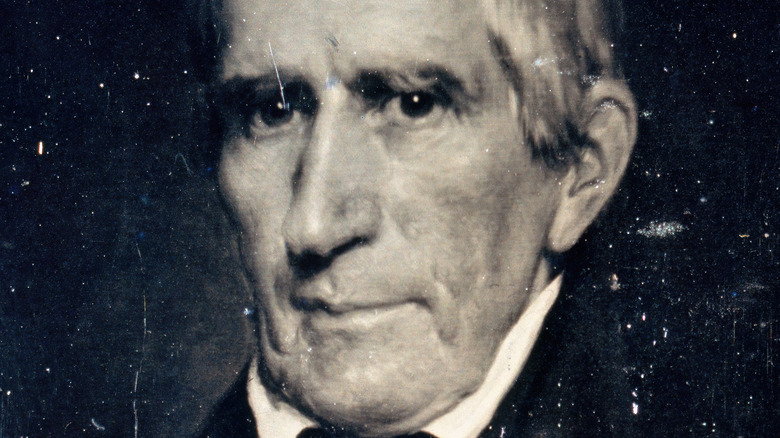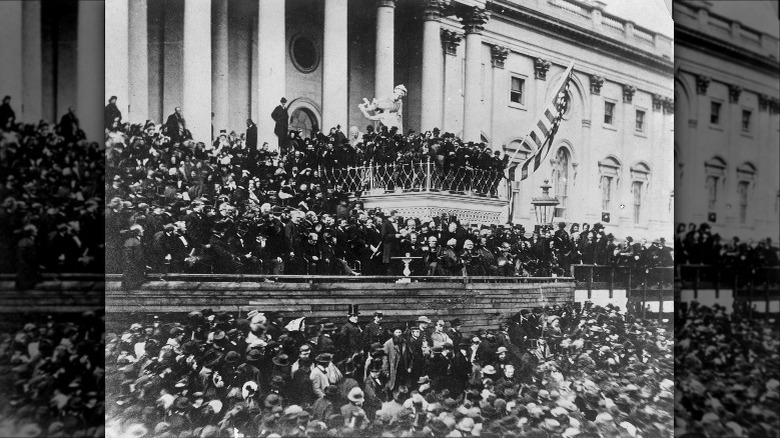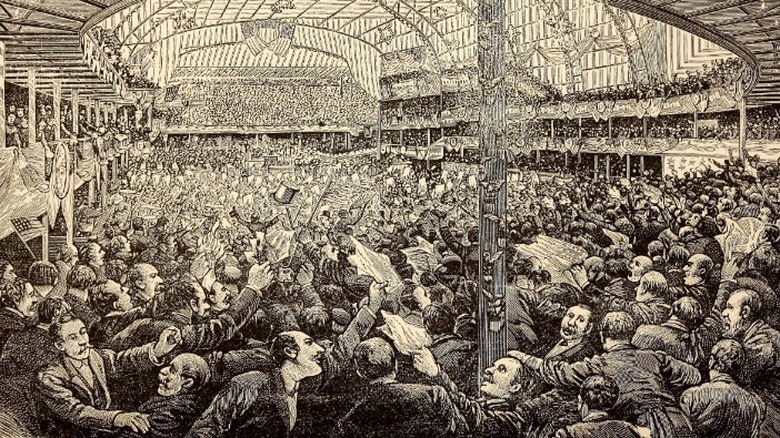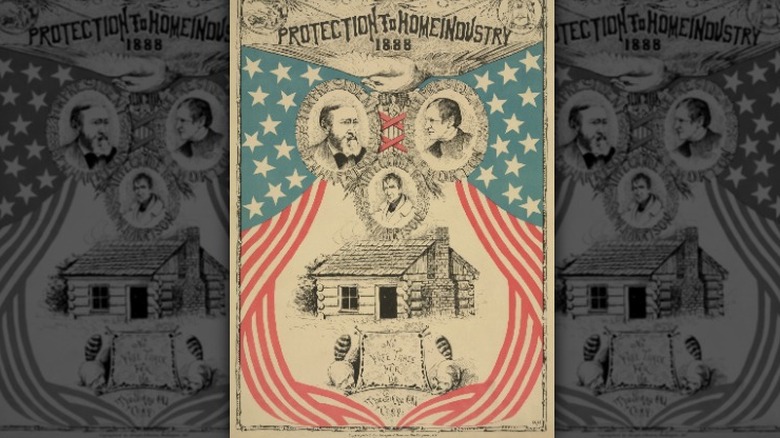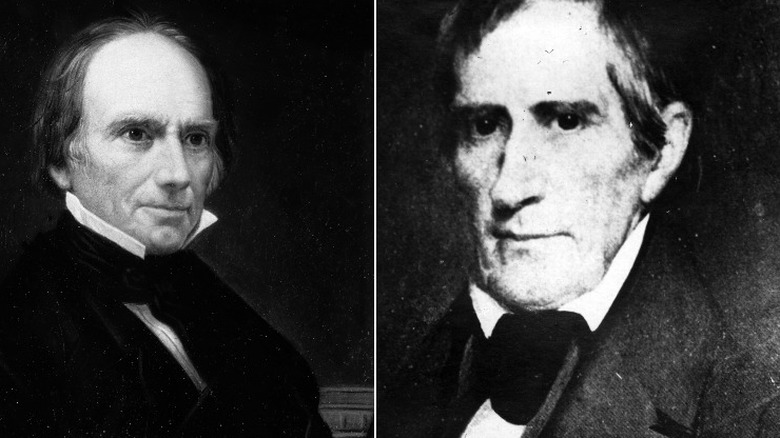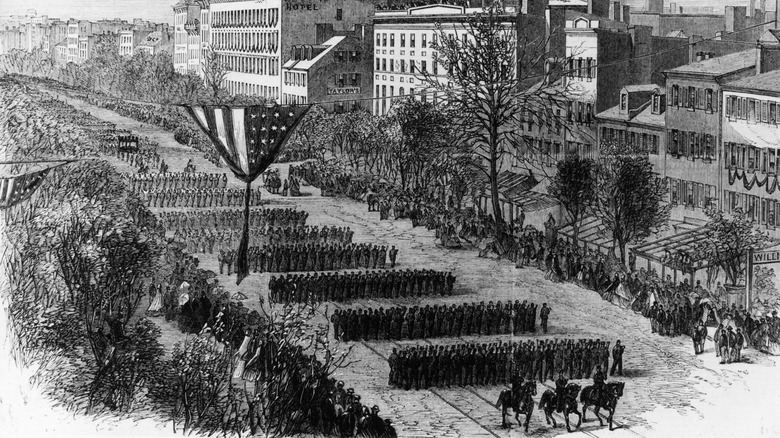Here's What William Henry Harrison Did During His Month As President
William Henry Harrison, the ninth president of the United States, was elected in 1840 along with vice-presidential candidate John Tyler (via Britannica). Harrison set many records during his term, although few of them were records anyone would hope to break: At age 68, Harrison was the oldest president to date so far. He gave the longest inaugural speech in White House history. He was the first president to die there.
His 32-day presidency is remembered for little but for this fact. Succeeded by former vice-president John Tyler, we never saw Harrison's promised attempts to shrink the power of the executive branch realized. Perhaps the lesson best learned from his brief tenure in executive office is a simple one: Your mother was right. Wear a jacket, or you'll catch a cold, whether you're a rosy-cheeked child or the president of the United States.
Harrison spent barely a month in office, but here's what he did during his extremely brief tenure as president of the United States.
He gave the Longest Inaugural Speech in History
On March 4, 1841, President William Henry Harrison rose before a crowd of over 50,000 people and delivered the longest inaugural speech in United States history. His speech lasted nearly two full hours and was over 8,000 words long (via "Presidents: A Biographical Dictionary, Library of Congress"). This was long for the era, and it's long even today — for context, Harrison's predecessor Martin Van Buren's inaugural address was 3,832 words long, while Andrew Jackson's was just over 1,100 words (via Statista).
As a slaveowner and member of the Virginia aristocracy himself (despite his public image as an everyman), Harrison came out as unequivocally pro-slavery in his inaugural address on March 4, 1841. In the address, he urged the public that abolishing slavery at the federal level would probably lead to a Civil War (via Miller Center, "William Henry Harrison: A Political Biography"). He also reiterated his commitment to defer to Congress on matters of policy, citing his belief in a weak executive branch. He also reiterated his vow never to run for a second term in office. Harrison delivered his lengthy speech while wearing no hat, gloves, or overcoat, despite the bitterly cold Washington day. Whether true or not, his failure to wear a jacket on Inauguration Day was often cited as the cause of the pneumonia that would eventually bring about his death on April 4, 1841 (via Miller Center, The Washington Post).
He called for a Special Session of Congress, Then Died Before It Began
According to "William Henry Harrison: A Political Biography," one of Harrison's few administrative acts in the early (and only) days of his presidency was to call for a special session of Congress to convene and address the matter of the nation's finances. Much of this debate would center around the issue of a National Bank. The National Bank's charter was set to expire that very year (via Britannica), much to the opposition of Harrison's fellow Whig Henry Clay. According to the Library of Congress, it was at Clay's urging that Harrison called for the special session on March 17. Harrison would never get to weigh in. He had promised in his inaugural address to let Congress steer policymaking without his interference, but he was also a Whig himself.
We'll never know how the matter would have unfolded with his leadership — before the special session convened on March 31, Harrison was already ill, consigned to bed rest.
He Hosted Countless Balls and Banquets
According to Dorothy Burne Goebel, author of "William Henry Harrison: A Political Biography," Harrison's early days in office were spent in a whirlwind of polite introductions and a barrage of overzealous requests from aspiring officeholders. A British traveler visiting Harrison's White House reportedly remarked, "Whoever called to pay him a visit was sure to be asked to dinner; whoever called for a place was sure to get a promise; whoever hinted at a want of money was sure to receive a draft; until it became the common talk that the President was overdrawing his account, overpromising his partisans, and overfeeding his friends." Harrison's schedule was indeed busy. Most of his waking hours were spent entertaining or fending off various parties that believed they were entitled to a political appointment in the Harrison administration.
In a letter from March 10, 1841 (via Shapell Manuscripts), Harrison wrote, "I am so much harassed by the multitude that call upon me that I can give no proper attention to any business of my own."
He Upset Henry Clay
While William Henry Harrison campaigned on the promise of a weak executive branch, the Whig Party expected to make their own choices for his cabinet. Henry Clay was led to believe he would be president in all but name, and a large part of that plan hinged on his congressional stronghold working in tandem with a Whig-directed White House cabinet of Clay's choosing. Harrison himself had promised to exercise only the presidential authority necessary for duty, promising to let Congress steer decisions of national policy. Clay, who had almost won the Whig nomination for the presidency himself, readily assumed the role of guiding policymaker. Harrison, however, grew tired of it.
"Presidents: A Biographical Dictionary" explains that Harrison's patience expired when Clay informed him of the Whig choice for treasury secretary. With his patience wearing thin, Harrison reportedly bristled and replied, "Mr. Clay, you forget that I am the president." Harrison had a change of heart about the Whig plan to populate his cabinet and made several of his own choices, causing a rift between Harrison and Clay from the earliest days of the presidency.
He Uttered Cryptic Last Words
According to "Death in the White House: President William Henry Harrison's Atypical Pneumonia" (via Clinical Infectious Diseases), Harrison first complained of illness on March 26, 1841, when he consulted the White House physician complaining of anxiety, fatigue, and digestive problems. It had been only three weeks since Inauguration Day. After initially improving that evening, Harrison rapidly grew more ill, and the doctor was called back the next day. The president's condition deteriorated over the following week, perhaps thanks in no small part to the various combinations of 19th-century medical treatments.
In the early morning hours of April 4, 1841, Harrison died. Sources record an enigmatic, pious aphorism as Harrison's final transmission before death. Clinical Infectious Diseases recalls the ninth's president's final words: "I wish you to understand the true principles of government. I wish them carried out." Thus Harrison's presidency, and his life, were complete.
